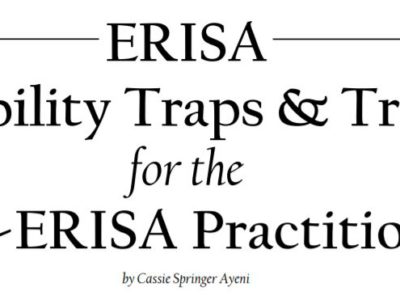Home » Bank & Financial » Reforming Disability Claim Procedures Under ERISA

Reforming Disability Claim Procedures Under ERISA
On Dec. 19, 2016, the U.S. Department of Labor published in the Federal Register sweeping reforms to the regulations it issues under Section 503 of the Employee Retirement Income Security Act, aimed at eliminating bias in the ERISA disability claims and review process.
Despite ERISA’s reputation as an erudite law affecting primarily pension plans, the DOL reports that, “An empirical study of ERISA employee benefits litigation from 2006 to 2010 concluded that cases involving long-term disability claims accounted for 64.5 percent of benefits litigation whereas lawsuits involving health care plans and pension plans accounted for only 14.4 percent and 9.3 percent, respectively.” (p. 3.) Hence the DOL’s decision to take aim at the regulations affecting disability plan administration, which is typically handled by insurance carriers.
The DOL noted “the economic incentive for insurance companies to deny otherwise valid claims and because plans are often able to secure a deferential standard of review in court.” (p. 8.) Although the DOL received commentary that disability claims administrators should not be subject to the same rigorous regulations issued under the Affordable Care Act to health plan administrators, “the department views enhancements in procedural safeguards and protections similar to those required for group health plans under the Affordable Care Act as being just as important, if not more important, in the case of claims for disability benefits.” (p. 10.) It noted the need for transparency and accountability in all claims handling. (p. 11.)
The department enhanced protections for disability plan participants in eight ways (pp. 11-12):
Increased independence and impartiality of the decision makers
Adverse decisions must fully explain the reasons for the denials and why evidence of the claimant was disagreed with
Notification to claimants of the right to obtain their claim file and other documents before a final decision is made and to present testimony and other evidence in support of their claim
Provision of an opportunity for claimants to respond to adverse medical opinions before a final decision is made
A guarantee that a claimant can proceed to litigation if the administrator fails to comply with the DOL regulations (stricter than “substantial compliance”)
A guarantee that a rescission of coverage triggers appeal rights under the regulations
Cultural and linguistically appropriate requirements for communications
A requirement that the notice of an adverse benefit determination on review must include a description of any applicable contractual limitations period and its expiration date (p. 54)
But perhaps the biggest protection is the first, requiring impartiality not just in claims decision makers, but also in vocational experts, medical consultants and in-house medical reviewers. (pp. 13-15.) And the DOL understood and took issue with the notion that impartiality could be achieved if the administrator, for example, hires a company who then hires the medical expert for review. It stated: “The text of the rule does not limit its scope to individuals that the plan directly hires. Rather, the rule’s coverage extends to individuals hired or compensated by third parties engaged by the plan with respect to claims.” (p. 15.) It cautioned that such a prohibition should not temper a court’s inquiry into the neutrality of the expert, noting the availability of discovery to probe such matters. (p. 16.)
The DOL further disabused the insurance practice of rejecting experts that would support an approval of benefits in favor or experts that would support denial as inappropriate “expert shopping.” (p. 20.) It found that “[r]equiring plans to explain the basis for disagreeing with experts whose advice the plan sought” should help that problem. (p. 20.) The department couched the requirement to explain disagreement with medical and vocational professionals in denying a claim “as a matter of basic fiduciary accountability.” (p. 22.)
Regarding Social Security disability awards, the department was careful to specify that although it does not expect administrators to defer to a favorable Social Security disability determination, “a more detailed justification would be required in a case where the U.S. Social Security Administration definitions were functionally equivalent to those under the plan.” (p. 25.) It refused, however, to adopt the “treating physician rule” present in Social Security decisions, where the administrator must defer to the opinion of the treating physician. (p. 25.)
The department vigorously defended its decision to allow claimants to review and rebut evidence that would be used to deny a claim. Commenters argued that claimants could provide an endless loop of evidence supporting a claim that the administrator would have to rebut endlessly as well. The DOL dismissed that argument as contrary to fiduciary obligations: “The fiduciary obligation to pay benefits in accordance with the terms of the plan does not require a fiduciary to endlessly rebut credible evidence supplied by a claimant that, if accepted, would be sufficient to justify granting the claim. In fact, an aggressive claims-processing practice of routinely rejecting or seeking to undermine credible evidence supplied by a claimant raises questions about whether a fiduciary, especially one operating under a conflict of interest, is violating the fiduciary’s loyalty obligation under ERISA to act solely in the interest of the plan’s participants and beneficiaries.” (p. 37.)
Controversially, the department approved a “tolling” of timelines for responding to claims and appeals where the claimant submits additional evidence for the administrator to consider. “In the department’s view, the current disability claims regulation ‘special circumstances’ provision permits the extension and tolling expressly added to the group health plan rule under the ACA claims and appeals final rule.” (p. 40.) It remains to be seen if this will deny claimants swift access to the courts or even allow a statute of limitations to expire while tolling is in place. See Heimeshoff v. Hartford Life & Accident Insurance Co., 134 S.Ct. 604, 611 (2013). Perhaps in anticipation of this conundrum, the department addressed the potential problem raised by the Heimeshoff decision where a statute of limitations could expire while a participant was engaging in the mandatory review process prescribed under ERISA Section 503. It stated:
First, Section 503 of ERISA requires that a plan afford a reasonable opportunity to any participant whose claim for benefits has been denied for a full and fair review of that decision by 53 an appropriate named fiduciary. The department does not believe that a claims procedure would satisfy the statutory requirement if the plan included a contractual limitations period that expired before the review was concluded …
A limitations period that expires before the conclusion of the plan’s internal appeals process on its face violates ERISA Section 503’s requirement of a full and fair review process. A process that effectively requires the claimant to forego the right to judicial review and thereby insulates the administrator from impartial judicial review falls far short of the statutory fairness standard and undermines the claims administrator’s incentives to decide claims correctly. (pp. 52-53.)
It further stated that a contractual limitations period that does not permit a lawsuit after the conclusion of an administrative appeal “is unenforceable.” (pp. 53-54.) In an effort to provide transparency, the department will now require administrators to state any contractual limitations period “including the date by which the claimant must bring a lawsuit” in a final adverse decision. (p. 53.)
However, the department did not provide much leeway for plan administrators to avoid litigation for failing to comply with the regulations. In fact, for the administrator to argue failure to exhaust administrative remedies despite noncompliance, the administrator’s failure to comply must be all of the following: “(1) de minimis; (2) nonprejudicial; (3) attributable to good cause or matters beyond the plan’s control; (4) in the context of an ongoing good-faith exchange of information; and (5) not reflective of a pattern or practice of noncompliance.” (p. 42.)
The department refused to provide a general rule on the level of deference an administrator would receive from a reviewing court, but did indicate that where the administrator’s noncompliance has resulted in a claim’s deemed exhaustion, the “legal effect of the definition may be that a court would conclude that de novo review is appropriate because of the regulation that determines as a matter of law that no fiduciary discretion was exercised in denying the claim.” (pp. 43-44.)




